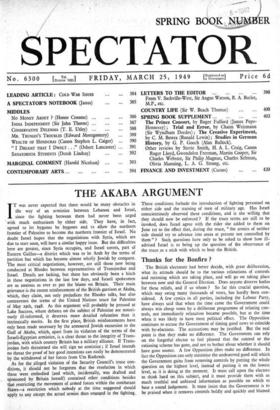THE AKABA ARGUMENT
IT was never expected that there would be many obstacles in the way of an armistice between Lebanon and Israel, since the fighting between them had never been urged with much enthusiasm by either side. They have, in fact, agreed to let bygones be bygones and to allow the northern
frontier of Palestine to become the northern frontier of Israel. No doubt Israel hopes that the negotiations with Syria, which are due to start soon, will have a similar happy issue. But the difficulties here are greater, since Syria occupies, and Israel covets, part of Eastern Galilee—a district which was to be Arab by the terms of partition but which has become almost wholly Jewish by conquest. The most critical negotiations, however, are still those now being conducted at Rhodes between representatives of Transjordan and Israel. Details are lacking, but there has obviously been a hitch in these negotiations in the last few days, and Israeli spokesmen are as anxious as ever to put the 'blame on Britain. Their main grievance is the recent reinforcement of the British garrison at Akaba, which, they claim, not only prejudices the Rhodes talks, but also contravenes the terms of the United Nations truce for Palestine of May 29th, 1948. As this argument will probably be pressed at Lake Success, where debates on the subject of Palestine are notori- ously ill-informed, it deserves more detailed refutation than it intrinsically merits. In the first place, British reinforcements have only been made necessary by the armoured Jewish excursion to the Gulf of Akaba, which, apart from its violation of the terms of the Israeli-Egyptian armistice, is a clear threat to the integrity of Trans- jordan, with which country Britain has a military alliance. If Trans- jordan feels threatened she will sign no armistice ; if Israel intends no threat the proof of her good intentions can easily be demonstrated by the withdrawal of her forces from Urn Rashrash.
As for the alleged violation of the Security Council's truce con- ditions, it should not be forgotten that the resolution in which these were embodied (and which, incidentally, was drafted and sponsored by Britain herself) contained other conditions besides that restricting the movement of armed forces within the combatant States—a restriction which nobody at the time suggested should apply to any except the actual armies then engaged in the fighting.
These conditions forbade the introduction of fighting personnel on either side and the training of men of military age. Has Israel conscientiously observed these conditions, and is she willing that they should now be enforced ? If the truce terms are still to be invoked, does Israel agree with the rider she added to them on June 1st to the effect that, during the truce, "the armies of neither side should try to advance into areas at present not controlled by them" ? Such questions have only to be asked to show how ill- advised Israel is to bring up the question of the observance of the truce as a stick with which to beat the British.














































